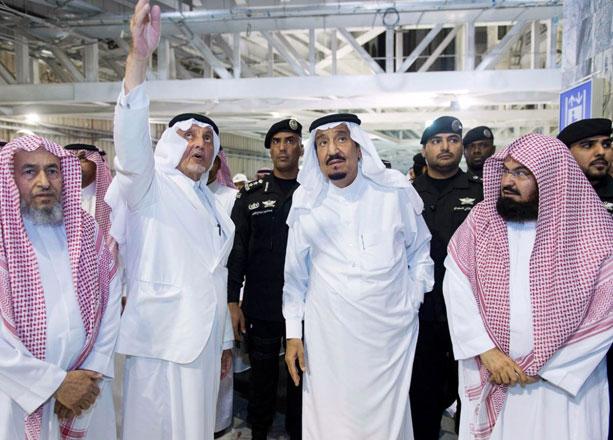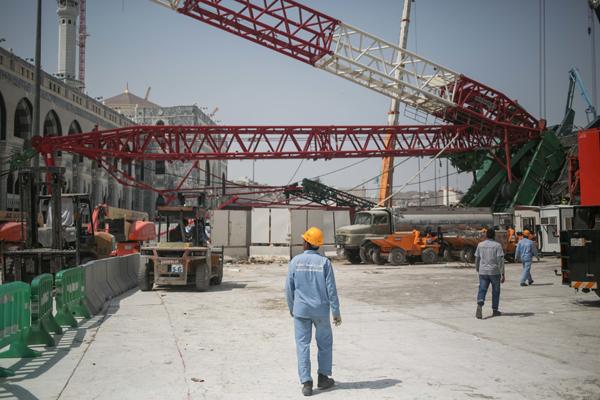You are here
Saudi king vows to find cause of pre-Hajj crane tragedy
By AFP - Sep 13,2015 - Last updated at Sep 13,2015

A handout picture provided by the Saudi Press Agency on Saturday shows Saudi King Salman Bin Abdulaziz (centre) listening to Mecca Governor Prince Khaled Al Faisal (2nd left) during a tour of the site where a crane fell inside the Grand Mosque in the holy city of Mecca (AFP photo/SPA)
Mecca — Saudi Arabia's King Salman vowed on Saturday to find out what caused a crane collapse that killed 107 people at Mecca's Grand Mosque ahead of the annual Hajj, the greater Muslim pilgrimage.
The Hajj, a pillar of the Muslim religion which last year drew about 2 million faithful, will take place despite Friday's tragedy, Saudi authorities said as crowds returned to pray a day after the incident.
Hundreds of thousands of pilgrims had already arrived in Mecca when the massive red and white crane toppled over during a Friday thunderstorm.
"We will investigate all the reasons and afterwards declare the results to the citizens," King Salman said after visiting the site, one of Islam's holiest.
Parts of the Grand Mosque remained sealed off on Saturday around the wreckage of the crane, which also injured around 200 people when it crashed into a courtyard.
But there was little mourning among pilgrims, who snapped pictures of the collapsed metal and continued with their prayers and rituals.
"I wish I had died in the accident, as it happened at a holy hour and in a holy place," Egyptian pilgrim Mohammed Ibrahim told AFP.
Om Salma, a Moroccan pilgrim, said "our phones have not stopped ringing since yesterday with relatives calling to check on us".
Indonesians and Indians were among those killed when the crane collapsed, while the injured included Malaysians, Egyptians, Iranians, Turks, Afghans and Pakistanis.
King Salman expressed his condolences to the families of the dead, and then visited a local hospital "to check on the health of the injured", the official Saudi Press Agency said.
"Suddenly, I heard thunder and then we heard a very loud noise. That was the sound of the crane falling," Mohammed, a Moroccan pilgrim, told AFP.
Another visitor caught up in the tragedy, Ahmed from Egypt, said he and those around him were "very scared, hysterical even".
A Saudi official said the Hajj, expected to start on September 21, would go ahead despite the tragedy.
"It definitely will not affect the Hajj this season, and the affected part will probably be fixed in a few days," said the official, who declined to be named.
The pilgrimage is a must for all able-bodied Muslims who can afford it.
An investigative committee has "immediately and urgently" begun searching for the cause of the collapse, SPA reported.
The contractor, engaged in a major expansion of the mosque, has been directed to ensure the safety of all other cranes at the site, it added.
The cranes soar skywards over the sprawling expansion taking place beneath the Mecca Royal Clock Tower, the world's third tallest building.
For years, work has been under way on a 400,000-square-metre enlargement of the Grand Mosque to allow it to accommodate up to 2.2 million people at once.
"We saw people dying before our eyes", the Arab News quoted Sheikh Abdul Raheem, a witness, as saying.
Pictures of the incident on Twitter showed bloodied bodies strewn across the courtyard, where part of the crane had landed atop an ornate, arched and colonnaded section of the complex.
'Act of God'
Irfan Al Alawi, co-founder of the Mecca-based Islamic Heritage Research Foundation, suggested that the authorities had been negligent by having a series of cranes overlooking the mosque.
"They do not care about the heritage, and they do not care about health and safety," he told AFP.
Alawi is an outspoken critic of redevelopment at the Muslim holy sites, which he says is wiping away tangible links to the Prophet Mohammed.
But an engineer for the Saudi Binladin Group, the developer, told AFP the crane had been installed in "an extremely professional way" and that there had been no technical problem.
"It was an act of God," he said.
Saudi Binladin Group belongs to the family of the late Al Qaeda leader Osama Bin Laden.
Sheikh Ahmed Al Ghamdi, former head of Mecca's religious police, told AFP the accident was a "test" from God.
"We need to accept what happened," he said, at the same time calling for a thorough investigation.
Condolences came in from around the world, including from Arab leaders, as well as from Britain, Canada, India and Nigeria.
It was not the first tragedy to strike Mecca pilgrims, although the Hajj has been practically incident-free in recent years.
In 2006, several hundred people died in a stampede during the Stoning of the Devil ritual in nearby Mina, following a similar incident two years earlier.
Related Articles
RIYADH, Saudi Arabia — Charges and a trial are expected soon in Saudi Arabia over last year's crane collapse in the Holy City of Mecca that
DUBAI, United Arab Emirates — Fourteen people have gone on trial in Saudi Arabia over a crane collapse in the Holy City of Mecca that killed
MECCA — A fire forced some 1,500 people from their hotel in the Saudi city of Mecca on Monday, as hundreds of thousands gathered for the Haj

















